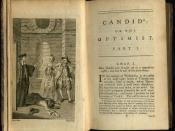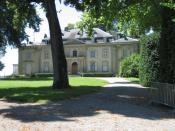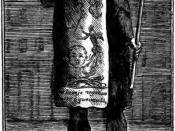Voltaire's "Candide" has many themes, though one central, philosophical theme traverses the entire work. This theme is a direct assault on the philosophy of Leibniz, Pope and others. Leibniz held that the world created by God was the best possible world with perfect order and reason. Alexander Pope, similarly, in his Essay on Man, argues that every human being is a part of a greater, rational, grand design of God. Pangloss stresses this viewpoint--that what appears to be evil is actually part of a greater good--when he asserts to Jacques that "private misfortunes make for public welfare."
Voltaire, on the other hand, found that his own experiences contradicted this optimistic determinism. Much like his protagonist, Candide, Voltaire must abandon this belief after realizing the needless suffering that surrounds him. Thus the major theme of the book revolves around this idea that the world is not the best of all possible ones, that it isn't determined by reason and order, and that accident and chance play a major role.
Though as a deist, Voltaire believed that God did create the world, he also believed that human injustice and brutality made the world anything but perfect. Furthermore, he believed that the fatalistic philosophy of Pope and others stripped man of his God-given free will.
In addition to his anti-philosophy current which runs throughout the work, Voltaire also satirically indicts religion and war. Almost from the first chapter to the last, Voltaire depicts religious men (priests, monks, etc) as hypocrites who don't live up to the religion they profess to believe. Most importantly, Voltaire makes the Church out to be one of the most corrupt, violence-ridden institutions on the planet. This is seen both during the Inquisition scene towards the middle of the book as well as the Jesuit satire seen while...


